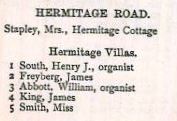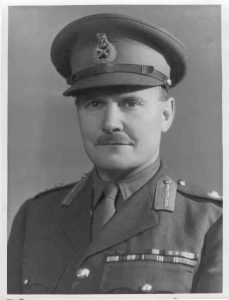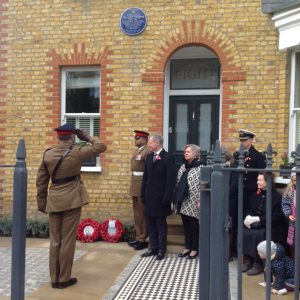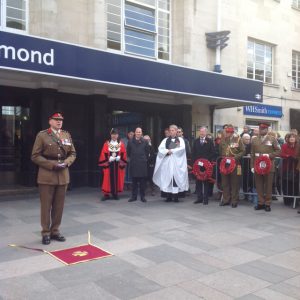Follow the Drum: Bernard Freyberg VC
Now, God be thanked Who has matched us with His hour… Peace by Rupert Brooke, 1914)
Patricia Moloney, Heritage Assistant, considers the life of Bernard Freyberg, renowned military leader who counted Richmond as his birthplace.
Seventh Governor-General of New Zealand (1946 – 52), Victoria Cross recipient (1916), awarded no less than 4 DSOs, a Knight (1942) and ultimately a Baron (1951), Bernard Freyberg achieved numerous accolades and attainments across a highly interesting, well-lived life.
Background
He was born in Richmond on 21 March 1889 and was the youngest of 4 brothers at this point living in Richmond: Paul and Cuthbert born in 2 Hermitage Villas, Hermitage Road, Richmond; Claude and Bernard born in 8 Dynevor Road, Richmond.  His father, James Freyberg was a Surveyor and his mother was called Julia (née Hamilton). Julia was a second marriage for James and Bernard was in fact the seventh son for his father. Bernard’s life spanned just over 74 years and he died in Windsor on 4 July 1963 following the rupture of one of his war wounds. He was laid to rest in the churchyard of St Martha’s, Chilworth, near Guildford in Surrey in a beautiful spot overlooking the surrounding countryside.
His father, James Freyberg was a Surveyor and his mother was called Julia (née Hamilton). Julia was a second marriage for James and Bernard was in fact the seventh son for his father. Bernard’s life spanned just over 74 years and he died in Windsor on 4 July 1963 following the rupture of one of his war wounds. He was laid to rest in the churchyard of St Martha’s, Chilworth, near Guildford in Surrey in a beautiful spot overlooking the surrounding countryside.
Bernard was affectionately known as ‘Tiny’ and later also referred to as ‘the Salamander’ by Churchill (due to his love of fire), when in command of the New Zealand forces in Crete during the Second World War. These alternative ‘titles’ give an indication of the physical presence of the man himself and also something of his soldierly skills. They inform us about how others responded to his presence and leadership.
Early days
The family moved to New Zealand when he was 2 years old (just missing inclusion in the 1891 Census in Richmond). James took up a position in the forestry department in Wellington. Freyberg was educated at Wellington College and it was there that he developed his skill as a strong swimmer which would prove valuable in his military career (he won the New Zealand Junior and Senior swimming titles in 1906 and 1910 respectively). It was here that he also sailed, boxed, rowed and played rugby. This gives an indication of the development of his physical strength and endurance: two traits that sustained him through some challenging and personally defining moments.
Bernard became sergeant in the cadets at Wellington College, creating a foundation for his future in the military. Clearly he also lived up to the college motto: ‘Lumen accipe et imperati’, (Receive the light and pass it on). It is worth noting that during the First Word War numerous Old Boys from the college volunteered and that in fact 223 of them are included in the Fallen. On leaving school he was educated at New Zealand University.
Starting out
Freyberg qualified as a dentist in 1911 while seeking and receiving a commission into the New Zealand Territorials in 1912. A sudden career change the following year involved assuming the role of ship’s stoker at one point (frequently young men worked their passage to another continent this way at that time).
Bernard left New Zealand in March 1914, travelling to San Francisco with the intent of opening a dental practice (he had sold all his silver swimming cups to raise the fare to travel to America). At this time there was a civil war raging in Mexico, and initially he became involved. Dentistry was dull (so we are told) and he crossed the Rio Grande to fight as a Captain on the revolutionary side with Pancho Villa. However, he eventually moved on to England (walking 300 miles to the coast to do so) when he heard news about the outbreak of war in Europe, so keen was he to volunteer. Stranded in New York, the prize money from a boxing tournament – where he knocked out the existing top heavyweight – funded his departure for London where he was destined to meet Winston Churchill.
The Great War
He was on the Belgian Front by September 1914, having secured a commission in the infant Royal Naval Division’s Hood Brigade. This was a direct outcome of meeting with Winston Churchill at the Admiralty in London. Freyberg met and persuaded the First Lord of the Admiralty to offer him that position. He was with this division at Antwerp and was then sent to Gallipoli at a Lieutenant-Commander. Freyberg gained the DSO for gallantry in April 1915 at in Gallipoli, famously swimming from ship to ship at night, lighting flares as part of a deception operation. It was an effort that took place on 24 April 1915 which was intended to divert Turkish attention from the main landing. This remarkable performance took place during the initial landings and Bernard served there until the Allied evacuation (for further details about the exploit read ‘A Richmond Man’ in the Richmond Herald, 13 April 1940). As if this deed in itself was not enough, Bernard had spent the night before his swim helping to bury a fellow officer. The fallen officer was none other than Rupert Brooke.
For Valour and Extreme Bravery
Subsequently, the Royal Naval Division was sent to France and Bernard fought as leader of the Hood Battalion at Beaumont Hamel, where he won his VC ‘through splendid personal gallantry’. Many Gallipoli survivors then served on the Western Front and Bernard found himself in action on the river Ancre during the final phase of the Allied Offensive at the Somme. He earned his VC for refusing to leave the Hood Battalion although he had received 4 wounds within 24 hours. Earlier, he had led an attack at Beaucourt (a strongly fortified village), resulting in the capture of 500 prisoners by his Battalion.
Promotion on 27 April 1917 to Brigadier-General (with the 29th Division) made him at the age of 27 the youngest to hold that rank in the British Army. He gained further distinction in 1918 by winning 2 bars to his DSO (the second being in the last 5 minutes of the war). By the time they reached the Armistice, Bernard had been wounded 9 times. Other accolades at this stage included: being appointed a Companion to the Most Distinguished Order of Saint Michael and Saint George (CMC) as well as being mentioned in dispatches on several occasions.
Inter-war years and beyond
Post-war, still suffering from his wounds, Bernard took a long sea voyage to New Zealand to visit his mother and, partly, to assist in his recovery.
Gazetted a Captain in the Grenadier Guards in 1919 and passing through the Staff College later on, Bernard gained valuable experience in a range of regimental and staff appointments which resulted in his promotion to Major-General in 1934. Indefatigable, he made 2 attempts to swim the English Channel in 1925 and 1926. On the first attempt he got within 400 yards of the English coast and on the subsequent attempt he was forced to give up purely due to the trouble that his 9 war wounds were giving him (they had temporarily disabled him). His determination and will were as strong as ever but impeded by this trying legacy of the war. He also attempted to get elected to the Commons unsuccessfully at this time. In 1936, Bernard was created Knights Commander of the Most Honourable Order of the Bath (KCB).
Ill health led to his retirement in 1937. A routine medical examination had revealed a heart problem (an irregular heart beat), forcing the cancellation of an appointment as General Officer Commanding in the Assam district of the eastern command in India. This situation was short-lived as he was able to return to the active list in 1939 as Commander of the New Zealand Expeditionary Forces (which he led in Greece).
Once New Zealand declared war on Germany (3 September 1939) Bernard he offered his services to the government of New Zealand (there were discussions with their Deputy Prime Minister, the Chief of the Imperial General Staff and Winston Churchill). (‘Naval VC on the Somme’ by Ron Gittins). The medical grading for Freyberg had been restored to a point that permitted him to serve in a role on active service overseas.
Superintending the evacuation to Crete he became Commander in Chief of the Allied Forces on the island in 1941. The Germans actually claimed to have killed him on Crete but (unsurprisingly) they did not get him. Bernard was involved throughout the campaigns in North Africa, in Italy with the Eight Army. It was notable that in New Zealanders fought courageously at the Battle of Monte Cassino and showed great bravery across the campaign. His New Zealander troops entered Trieste in triumph on May 2nd 1945. He fought under Generals Montgomery, Alexander and the American Mark Clark. For example, when in North Africa he played a key role in the second battle for El Alamein and also being wounded in Egypt in June 1942 by a German shell. He was to survive the battlefield.
Bernard Freyberg: the person
Bernard married Barbara (widow of the Hon. Francis McLaren, MP and daughter of the late Colonel Sir Herbert Jekyll). She had lost her husband in August 1917 and she re-married in June 1922. Their son served in the Grenadier Guards during the Second World War.
One story told of him is that he said: ‘You know, I do love my war’ to a friend on the battlefield in the First World War. Another anecdote is that on meeting von Ribbentrop at dinner during the Second World War, the German said: ‘Of course we must have our colonies back’ to which Freyberg riposted ‘Well, take it from me you won’t ever get them’.
Sir James Barrie, the novelist and dramatist was a great friend of Freyberg. He took him as the embodiment of courage in a celebrated address that he delivered after the First World War as rector of St Andrew’s. (‘Freyberg is Nemesis’ by A.E. Cummings in the Vancouver Daily Province, June 24th 1941). Bernard himself said that the six years he served as Governor General of New Zealand were the happiest of his life. (Gittins).
Freyberg, the soldier and man can rightly be described as dogged, determined and a tower of strength. On countless occasions he displayed valour. Those who got to know him on a personal level were, of course, aware of these characteristics but could also appreciate his human side too; it was personal qualities he viewed as important in gauging individual worth not rank or position. And this view underpinned his own endeavours and many achievements.
More information about his life and achievements can be found in the Richmond upon Thames Local Studies Library and Archive at the Old Town Hall, Whittaker Avenue, Richmond, TW9 1TP. Archive material including his birth certificate can be viewed there without appointment, as well as the biography written by Major General W. G. Stevens Freyberg, VC: the Man 1939 – 45.
See also Ian Wards, ‘Freyberg, Bernard Cyril, first Baron Freyberg (1889–1963)’, Oxford Dictionary of National Biography, Oxford University Press, 2004; online edn, Jan 2011 [http://www.oxforddnb.com/view/article/33276]
[Patricia Moloney, Heritage Assistant]
To commemorate his life, and the award of his VC, a blue plaque will be unveiled outside his former home at 8 Dynevor Road, Richmond TW10 6PF at 11.00am on Saturday 5 November 2016 along with the later unveiling of a special paving stone outside Richmond Railway Station at 11.45am.
Post script: 11 November 2016.
Photographs of the unveiling ceremonies. Further photographs are available to view at the Local Studies Library & Archive.


